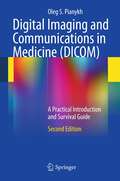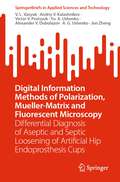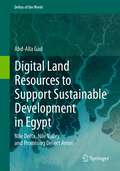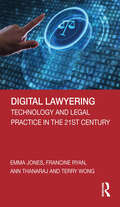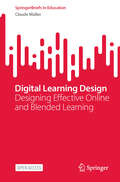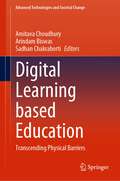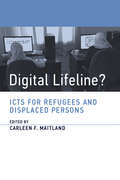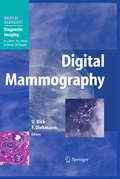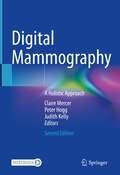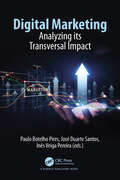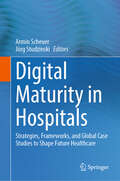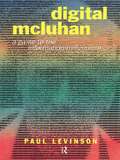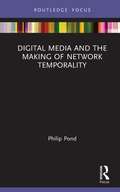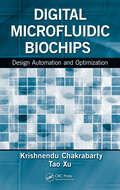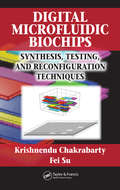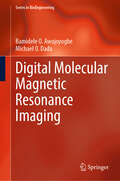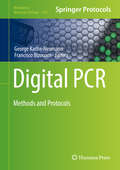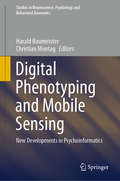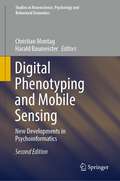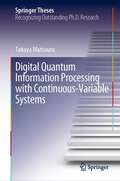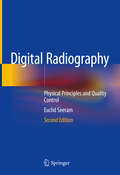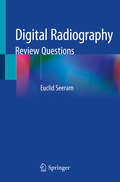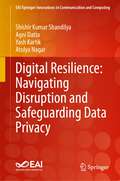- Table View
- List View
Digital Imaging and Communications in Medicine (DICOM)
by Oleg S. PianykhThis is the second edition of a very popular book on DICOM that introduces this complex standard from a very practical point of view. It is aimed at a broad audience of radiologists, clinical administrators, information technologists, medical students, and lecturers. The book provides a gradual, down to earth introduction to DICOM, accompanied by an analysis of the most common problems associated with its implementation. Compared with the first edition, many improvements and additions have been made, based on feedback from readers. Whether you are running a teleradiology project or writing DICOM software, this book will provide you with clear and helpful guidance. It will prepare you for any DICOM projects or problem solving, and assist you in taking full advantage of multifaceted DICOM functionality.
Digital Information Methods of Polarization, Mueller-Matrix and Fluorescent Microscopy: Differential Diagnosis of Aseptic and Septic Loosening of Artificial Hip Endoprosthesis Cups (SpringerBriefs in Applied Sciences and Technology)
by Jun Zheng A. G. Ushenko Yu. A. Ushenko Alexander V. Dubolazov V. L. Vasyuk Andriy V. Kalashnikov Victor V. ProtsyukThis book highlights the effectiveness of differential diagnosis in the degree of severity of joint pathology from a clinical, biophysical, and informational point of view. It includes the following information blocks: • Two-dimensional digital polarization microscopy of polycrystalline films of synovial fluid and determination of the coordinate distributions of the orientation and phase parameters of the microscopic image from a set of parameters of the Stokes vector. • Mueller-matrix mapping of polycrystalline films of synovial fluid and determination of a set of coordinate distributions (Mueller-matrix images (MMI)) of azimuthal-invariant elements that characterize manifestations of optical activity and linear birefringence. • Development of algorithms for polarization reproduction of distributions of linear and circular birefringence of polycrystalline films of synovial fluid. • Identification of digital statistical, correlation and wavelet criteria of polarization and Mueller-matrix differential diagnosis of the degree of severity of joint pathology. • Determination of maps of laser-induced fluorescence of synovial fluid polycrystalline films. • Identification of statistical and correlational criteria for fluorescent differential diagnosis of the degree of severity of joint pathology. • Operational characteristics of the power of the methods of azimuth-invariant polarization, Mueller-matrix and laser autofluorescence microscopy of polycrystalline films of synovial fluid.
Digital Land Resources to Support Sustainable Development in Egypt: Nile Delta, Nile Valley and Promising Desert Areas (Deltas of the World)
by Abd-Alla GadThis book provides accurate and integrated information about land resources especially with the accelerated progress of information technology to help Egypt and similar countries to achieve the country sustainable development goals in the field of agriculture and natural resources. The Egyptian National sustainable development plans mainly aim to conserve the arable lands in the Nile Delta and the Nile Valley, in addition to the oases and desert fringes. Moreover, increasing land productivity is a vital national goal for filling the food gap. Consequently, providing accurate and integrated information about land natural resources using the recent technologies such as satellite data/images and geoinformatics techniques. Such information would be a base for planning, decision making and research needs all over the world due to the importance of Egypt as the biggest and leading country in the MENA regions. The book provides land natural resources database as a platform, upon which additional thematic information can be added in the future to serve multi approached sustainable development. The book highlights the usage of digital information in monitoring urban planning and encroachment, in addition to soil and land capability classification. Moreover, networks of irrigation/drainages, railways, and utilities are added for a wide management range. Various available information systems were employed to initiate the targeted land resources database (e.g., ArcGIS, ERDAS IMAGINE and ENVI). Data of previous soil survey projects were the basis for the created digital database including High Dam Soil Survey, Soil map of Egypt and Land Master Plane. The Digital Elevation Model (DEM) was elaborated using SRTM space images, in addition to spot heights and contour lines derived from the topographic maps (scale 1:50,000) produced by the Egyptian Survey Authority (ESA). The resulted thematic layers were incorporated in the created GIS land resources database. The book is a unique and a great source of information and knowledge for all researchers around the globe particularly for MENA regions. Researchers, graduate students, the policy planners and decision making will find this book very useful for them. are most people who could benefit from the book. We believe the book will be an added value to the existing information and knowledge.
Digital Lawyering: Technology and Legal Practice in the 21st Century
by Emma Jones Francine Ryan Ann Thanaraj Terry WongIn today’s rapidly changing legal landscape, becoming a digital lawyer is vital to success within the legal profession. This textbook provides an accessible and thorough introduction to digital lawyering, present and future, and a toolkit for gaining the key attributes and skills required to utilise technology within legal practice effectively. Digital technologies have already begun a radical transformation of the legal profession and the justice system. Digital Lawyering introduces students to all key topics, from the role of blockchain to the use of digital evidence in courtrooms, supported by contemporary case studies and integrated, interactive activities. The book considers specific forms of technology, such as Big Data, analytics and artificial intelligence, but also broader issues including regulation, privacy and ethics. It encourages students to explore the impact of digital lawyering upon professional identity, and to consider the emerging skills and competencies employers now require. Using this textbook will allow students to identify, discuss and reflect on emerging issues and trends within digital lawyering in a critical and informed manner, drawing on both its theoretical basis and accounts of its use in legal practice. Digital Lawyering is ideal for use as a main textbook on modules focused on technology and law, and as a supplementary textbook on modules covering lawyering and legal skills more generally.
Digital Learning Design: Designing Effective Online and Blended Learning (SpringerBriefs in Education)
by Claude MüllerThis is an open access book. The shift from traditional teaching to digital learning presents a significant challenge for many educators. Navigating the complexities of digital course designs can often lead to suboptimal learning experiences that fail to engage learners effectively. Digital Learning Design: Designing Effective Online and Blended Learning aims to address this challenge by offering a comprehensive guide that combines cognitive science principles with practical design strategies. This book equips learning professionals—including trainers, teachers, and digital learning experts—with the knowledge and tools needed to create impactful and attractive online and blended learning environments to foster both meaningful engagement and knowledge retention in today&’s digital landscape.
Digital Learning based Education: Transcending Physical Barriers (Advanced Technologies and Societal Change)
by Arindam Biswas Amitava Choudhury Sadhan ChakrabortiThis book presents the systematic evolution of digitized education: trends, advances, challenges encountered and their solutions toward the use of advanced technologies. The book mainly covers variety of areas such as blended learning in modern education, flipped classroom, ICT-based education, digital transformation of education. Explosion of information and communication technologies has transformed the way we live, learn, work and socialize. This heavy intervention of technologies in the modern world has triggered us to think how we engage and interact with each other and how we make use of these digital tools and communications channels. And consequent upon which societies are transforming into digitized education where datafication, platformization and algorithmic governance are a common vocabulary.
Digital Lifeline?: ICTs for Refugees and Displaced Persons (Information Policy)
by Carleen F. MaitlandInterdisciplinary perspectives on the role of new information technologies, including mobile phones, wireless networks, and biometric identification, in the global refugee crisis.Today's global refugee crisis has mobilized humanitarian efforts to help those fleeing persecution and armed conflict at all stages of their journey. Aid organizations are increasingly employing new information technologies in their mission, taking advantage of proliferating mobile phones, remote sensors, wireless networks, and biometric identification systems. Digital Lifeline? examines the use of these technological innovations by the humanitarian community, exploring operations and systems that range from forecasting refugee flows to providing cellular and Internet connectivity to displaced persons. The contributors, from disciplines as diverse as international law and computer science, offer a variety of perspectives on forced migration, technical development, and user behavior, drawing on field work in countries including Jordan, Lebanon, Rwanda, Germany, Greece, the United States, and Canada. The chapters consider such topics as the use of information technology in refugee status determination; ethical and legal issues surrounding biometric technologies; information technology within organizational hierarchies; the use of technology by refugees; access issues in refugee camps; the scalability and sustainability of information technology innovations in humanitarian work; geographic information systems and spatial thinking; and the use of “big data” analytic techniques. Finally, the book identifies policy research directions, develops a unified research agenda, and offers practical suggestions for conducting displacement research.ContributorsElizabeth Belding, Karen E. Fisher, Daniel Iland, Lindsey N. Kingston, Carleen F. Maitland, Susan F. Martin, Galya Ben-Arieh Ruffer, Paul Schmitt, Lisa Singh, Brian Tomaszewski, Mariya Zheleva
Digital Mammography
by Felix Diekmann Ulrich BickThis state-of-the-art reference book provides in-depth coverage of all aspects of digital mammography, including detector technology, image processing, computer-aided diagnosis, soft-copy reading, digital workflow, and PACS. Specific advantages and disadvantages of digital mammography in comparison to screen-film mammography are thoroughly discussed. By including authors from both North America and Europe, the book is able to outline variations in the use, acceptance, and quality assurance of digital mammography between the different countries and screening programs. Advanced imaging techniques and future developments such as contrast mammography and digital breast tomosynthesis are also covered in detail. All of the chapters are written by internationally recognized experts and contain numerous high-quality illustrations. This book will be of great interest both to clinicians who already use or are transitioning to digital mammography and to basic scientists working in the field.
Digital Mammography: A Holistic Approach
by Peter Hogg Judith Kelly Claire MercerThis heavily revised second edition is a practically focused textbook focusing on how to successfully utilise mammography-related techniques. It covers a wide range of topics related to holistic mammographic imaging reflecting the emerging digital and artificial imaging technology. Furthermore, new chapters provide clear practical focused guidance on how to provide psychological and emotional support to both clients and colleagues, and the support of persons with dementia.Digital Mammography: A Holistic Approach is a concise textbook covering the latest techniques that can be applied in this field. Therefore, it is of significant interest to radiographers, technicians, technologists, physicists, and nurses seeking to improve their understanding of these techniques. Additional questions via app: Download the Springer Nature Flashcards app for free and use exclusive additional material to test your knowledge.
Digital Marketing: Analyzing its Transversal Impact (Advances In Marketing, Customer Relationship Management, And E-services Ser.)
by José Duarte Santos Paulo Botelho Pires Inês Veiga PereiraDigital marketing is not a new concept, it is not a trend, and it is not a fad either. Digital marketing has existed for over twenty years and is currently applied in all areas and marketing activities. For this reason, it is necessary to know the changes it has brought about, both in the theoretical framework, so that it can be taught, and from an empirical perspective, so that it can be applied in real contexts. The changes have been profound and far-reaching.This work addresses this theme, aiming to analyse the transversal impact of the digital in the different marketing sectors, describing the profound changes that the digital has provoked in the main marketing activities and their sectors, also referring to the current practices in use in each included topic. It begins by looking at the classic marketing topics, opening with an analysis of the impact that digital has had and is having on the marketing strategy of organisations, moving on to the study of consumer behaviour in an era of continuous use of electronic devices. This is followed by a new topic which is marketing research and data analysis, in a context where managers now have, more data, information and knowledge about the organisation, competitors, consumers and the wider environment than ever before. Marketing themes were also identified that have been significantly changed with digital. Communication is another of the themes of reference, with profound changes in recent times, followed by management of sales teams, supply chain management, relationship marketing, and internal marketing. The last chapters are also relevant contributions, being dedicated to marketing sectors: services, B2B marketing, internationalisation, politics, tourism, and NGOs.
Digital Maturity in Hospitals: Strategies, Frameworks, and Global Case Studies to Shape Future Healthcare
by Armin Scheuer Jörg StudzinskiThis book serves as a comprehensive guide for hospitals embarking on a digital maturity journey, offering actionable insights, best practices, and lessons learned from healthcare leaders worldwide. It brings together contributions from over 50 world-renowned digital health experts, providing hospitals with the tools and strategies needed to successfully drive digital transformation to benefit both healthcare workers and patients. Covering a broad range of topics, the chapters delve into critical dimensions of hospital digitalization, including digital maturity models, IT capability, interoperability, governance, patient-centered care, and advanced data analytics. Readers will find real-world case studies showcasing hospitals and governmental initiatives that have achieved externally validated success in their digital transformation efforts. As emphasized in the Foreword written by the President of the International Diabetes Federation, the book highlights the impact of digital maturity on patient care and explores forward-looking trends that will shape the future of healthcare digitalization, such as green IT, ethical considerations, social determinants of health, and workforce development. Whether you are a healthcare leader, policy maker, or practitioner, this book offers valuable guidance and strategic insights to help you navigate your organization’s digital maturity journey and drive excellence in healthcare delivery.
Digital McLuhan: A Guide to the Information Millennium
by Paul LevinsonMarshall McLuhan died on the last day of 1980, on the doorstep of the personal computer revolution. Yet McLuhan's ideas anticipated a world of media in motion, and its impact on our lives on the dawn of the new millennium.Paul Levinson examines why McLuhan's theories about media are more important to us today than when they were first written, and why the Wired generation is now turning to McLuhan's work to understand the global village in the digital age.
Digital Media and the Making of Network Temporality
by Philip PondThis book presents an exciting new theory of time for a world built on hyper-fast digital media networks. Computers have changed the human social experience enormously. We’re becoming familiar with many of the macro changes, but we rarely consider the complex, underlying mechanics of how a technology interacts with our social, political and economic worlds. And we cannot explain how the mechanics of a technology are being translated into social influence unless we understand the role of time in that process. Offering an original reconsideration of temporality, Philip Pond explains how super-powerful computers and global webs of connection have remade time through speed. The book introduces key developments in network time theory and explains their importance, before presenting a new model of time which seeks to reconcile the traditionally separate subjective and objective approaches to time theory and measurement.
Digital Microfluidic Biochips: Design Automation and Optimization
by Krishnendu Chakrabarty Tao XuMicrofluidics-based biochips combine electronics with biochemistry, providing access to new application areas in a wide variety of fields. Continued technological innovations are essential to assuring the future role of these chips in functional diversification in biotech, pharmaceuticals, and other industries.Revolutionary guidance on design, opti
Digital Microfluidic Biochips: Synthesis, Testing, and Reconfiguration Techniques
by Krishnendu Chakrabarty Fei SuDigital Microfluidic Biochips focuses on the automated design and production of microfluidic-based biochips for large-scale bioassays and safety-critical applications. Bridging areas of electronic design automation with microfluidic biochip research, the authors present a system-level design automation framework that addresses key issues in the design, analysis, and testing of digital microfluidic biochips. The book describes a new generation of microfluidic biochips with more complex designs that offer dynamic reconfigurability, system scalability, system integration, and defect tolerance. Part I describes a unified design methodology that targets design optimization under resource constraints. Part II investigates cost-effective testing techniques for digital microfluidic biochips that include test resource optimization and fault detection while running normal bioassays. Part III focuses on different reconfiguration-based defect tolerance techniques designed to increase the yield and dependability of digital microfluidic biochips. Expanding upon results from ongoing research on CAD for biochips at Duke University, this book presents new design methodologies that address some of the limitations in current full-custom design techniques. Digital Microfluidic Biochips is an essential resource for achieving the integration of microfluidic components in the next generation of system-on-chip and system-in-package designs.
Digital Molecular Magnetic Resonance Imaging (Series in BioEngineering)
by Michael O. Dada Bamidele O. AwojoyogbeThis book pushes the limits of conventional MRI visualization methods by completely changing the medical imaging landscape and leads to innovations that will help patients and healthcare providers alike. It enhances the capabilities of MRI anatomical visualization to a level that has never before been possible for researchers and clinicians. The computational and digital algorithms developed can enable a more thorough understanding of the intricate structures found within the human body, surpassing the constraints of traditional 2D methods. The Physics-informed Neural Networks as presented can enhance three-dimensional rendering for deeper understanding of the spatial relationships and subtle abnormalities of anatomical features and sets the stage for upcoming advancements that could impact a wider range of digital heath modalities. This book opens the door to ultra-powerful digital molecular MRI powered by quantum computing that can perform calculations that would take supercomputers millions of years.
Digital PCR: Methods And Protocols (Methods in Molecular Biology #1768)
by George Karlin-Neumann Francisco BizouarnThis volume explores and explains how digital PCRs (dPCRs) help in the study of numerous topics, such as infectious diseases, evolution of cancer and treatment responses, somatic mosaicism, genome editing and cell therapy, and food testing for GMOs and pathogens. Written in the highly successful Methods in Molecular Biology series format, chapters include introductions to their respective topics, lists of the necessary materials and reagents, step-by-step, readily reproducible laboratory protocols, and tips on troubleshooting and avoiding known pitfalls.Authoritative and thorough, Digital PCR: Methods and Protocols is a valuable resource for specialists in various fields, including geneticists, neurologists, immunologists, oncologists, and researchers who are interested in environmental sciences.”
Digital Phenotyping and Mobile Sensing: New Developments in Psychoinformatics (Studies in Neuroscience, Psychology and Behavioral Economics)
by Christian Montag Harald BaumeisterThis book offers a snapshot of cutting-edge applications of mobile sensing for digital phenotyping in the field of Psychoinformatics. The respective chapters, written by authoritative researchers, cover various aspects related to the use of these technologies in health, education, and cognitive science research. They share insights both into established applications of mobile sensing (such as predicting personality or mental and behavioral health on the basis of smartphone usage patterns) and emerging trends. Machine learning and deep learning approaches are discussed, and important considerations regarding privacy risks and ethical issues are assessed. In addition to essential background information on various technologies and theoretical methods, the book also presents relevant case studies and good scientific practices, thus addressing researchers and professionals alike. To cite Thomas R. Insel, who wrote the foreword to this book: “Patients will only use digital phenotyping if it solves a problem, perhaps a digital smoke alarm that can prevent a crisis. Providers will only use digital phenotyping if it fits seamlessly into their crowded workflow. If we can earn public trust, there is every reason to be excited about this new field. Suddenly, studying human behavior at scale, over months and years, is feasible.”
Digital Phenotyping and Mobile Sensing: New Developments in Psychoinformatics (Studies in Neuroscience, Psychology and Behavioral Economics)
by Christian Montag Harald BaumeisterThis book offers a snapshot of cutting-edge applications of digital phenotyping and mobile sensing for studying human behavior and planning innovative e-healthcare interventions. The respective chapters, written by authoritative researchers, cover both theoretical perspectives and good scientific and professional practices related to the use and development of these technologies. They share novel insights into established applications of mobile sensing, such as predicting personality or mental and behavioral health on the basis of smartphone usage patterns, and highlight emerging trends, such as the use of machine learning, big data and deep learning approaches, and the combination of mobile sensing with AI and expert systems. Important issues relating to privacy and ethics are analyzed, together with selected case studies. This thoroughly revised and extended second edition provides researchers and professionals with extensive information on the latest developments in the field of digital phenotyping and mobile sensing. It gives a special emphasis to trends in diagnostics systems and AI applications, suggesting important future directions for research in public health and social sciences.
Digital Quantum Information Processing with Continuous-Variable Systems (Springer Theses)
by Takaya MatsuuraThe book provides theoretical methods of connecting discrete-variable quantum information processing to continuous-variable one. It covers the two major fields of quantum information processing, quantum communication and quantum computation, leading to achievement of a long-sought full security of continuous-variable quantum key distribution (QKD) and proposal of a resource-efficient method for optical quantum computing. Firstly, the book provides a security of continuous-variable QKD against arbitrary attacks under a realistic condition such as finite communication rounds and the use of digitized information processing. The book also provides the unified view for conventionally used approximate Gottesman-Kitaev-Preskill (GKP) codes, which encodes qudits on a continuous-variable system, enabling direct comparison between researches based on different approximations. The book finally proposes a resource-efficient method to realize the universal optical quantum computation using the GKP code via the direct preparation of the GKP magic state instead of GKP Pauli states. Feasibility of the proposed protocol is discussed based on the existing experimental proposals for the GKP state preparation.
Digital Radiography: Physical Principles and Quality Control
by Euclid SeeramThis is the second edition of a well-received book that enriches the understanding of radiographers and radiologic technologists across the globe, and is designed to meet the needs of courses (units) on radiographic imaging equipment, procedures, production, and exposure. The book also serves as a supplement for courses that address digital imaging techniques, such as radiologic physics, radiographic equipment and quality control. In a broader sense, the purpose of the book is to meet readers’ needs in connection with the change from film-based imaging to film-less or digital imaging; today, all radiographic imaging worldwide is based on digital imaging technologies. The book covers a wide range of topics to address the needs of members of various professional radiologic technology associations, such as the American Society of Radiologic Technologists, the Canadian Association of Medical Radiation Technologists, the College of Radiographers in the UK, and the Australian and New Zealand Societies for Radiographers.
Digital Radiography: Review Questions
by Euclid SeeramThis book serves as a supplement to the book ‘Digital Radiography: Physical Principles and Quality Control, 2nd Edition (ISBN 978-981-13-3243-2)’ published by Springer Nature in 2019. This book includes review questions of multiple choices, true/false and short answer formats based on the chapters of the already published book along with their answers. It includes questions that mimic the nature of the questions in certification examinations of professional radiologic technologist organizations, such as the American Association of Radiological Technologists (ASRT) and the Canadian Association of Medical Radiation Technologists (CAMRT) and other certification organizations in the United Kingdom and Australia. The book includes 10-15 review questions on each of the essential topics covering the scope of digital radiography (DR), such as definition of DR, limitations of film-screen radiography, digital image processing concepts, physics and technology of computed radiography (CR), flat-panel digital radiography (FPDR), image quality descriptors including artifacts for CR and FPDR, the standardized exposure indicator, the technical aspects of digital fluoroscopy, digital mammography, digital tomosynthesis, picture archiving and communication systems (PACS), imaging informatics, quality control for DR, and radiation dose optimization in DR. The book is relevant for diagnostic radiography students, diagnostic radiology residents (MDs), radiology practitioners and biomedical engineering technologists all over the world.
Digital Resilience: Navigating Disruption and Safeguarding Data Privacy (EAI/Springer Innovations in Communication and Computing)
by Atulya Nagar Shishir Kumar Shandilya Agni Datta Yash KartikThis book offers an in-depth overview of digital resilience, defined as the ability of individuals, organizations, and societies to adapt to and counter various digital threats such as cyberattacks, data breaches, and other forms of cyber threats. Digital resilience not only enables proactive measures but also ensures fault-tolerant planning and design. The book elaborates on the necessary techniques and methods to achieve digital resilience. Key methodologies, including quantum computing, post-quantum cryptography, nature-inspired cybersecurity, zero-trust systems, zero-knowledge proofs, multi-party computation, and the emerging field of space security, are discussed in detail. The book provides insights into artificial intelligence and machine learning, examining their impact on society and organizations. It critically analyses the role of cybersecurity in businesses, emphasizing its importance for safety and economic stability. In addition, the book discusses notable cyber incidents, offering valuable insights into digital resilience. It serves as a comprehensive compilation, featuring key terms, definitions, case studies, and references to existing literature and research in cybersecurity, analytics, information sciences, future computing, digital resilience, and related fields.
Digital SLR Astrophotography
by Michael A. CovingtonIn the last few years, digital SLR cameras have taken the astrophotography world by storm. It is now easier to photograph the stars than ever before! They are compact and portable, flexible to adapt with different lenses and for telescope use, and above all DSLR cameras are easy and enjoyable to use. In this concise guide, experienced astrophotography expert Michael Covington outlines the simple, enduring basics that will enable you to get started, and help you get the most from your equipment. He covers a wide selection of equipment, simple and advanced projects, technical considerations and image processing techniques. Unlike other astrophotography books, this one focuses specifically on DSLR cameras, not astronomical CCDs, non-DSLR digital cameras, or film. This guide is ideal for astrophotographers who wish to develop their skills using DSLR cameras and as a friendly introduction to amateur astronomers or photographers curious about photographing the night sky.
Digital SLR Astrophotography: How To Use A Computerized Telescope (Practical Amateur Astronomy Ser.)
by Michael A. CovingtonDigital SLR cameras have made it easier than ever before to photograph the night sky. Whether you're a beginner, nature photographer, or serious astronomer, this is the definitive handbook to capturing the heavens. Starting with simple projects for beginners such as cameras on tripods, it then moves onto more advanced projects including telescope photography and methods of astronomical research. With 80% revised and updated material, this new edition covers nightscapes, eclipses, using cameras with sky trackers and telescopes, and tools for identifying celestial objects and investigating them scientifically. Image processing is discussed in detail, with worked examples from three popular software packages - Nebulosity, Maxlm DL, and PixInsight. Rather than taking a recipe-book approach, Covington explains how your equipment works as well as offering advice on many practical considerations, such as choice of set-up and the testing of lenses, making this a comprehensive guide for anyone involved in astrophotography.
